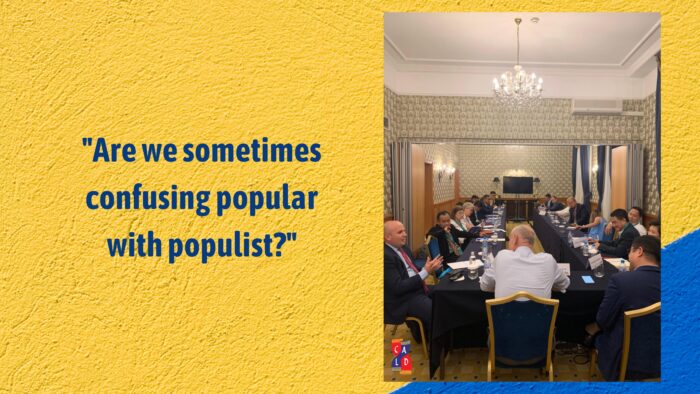
“Are we sometimes confusing popular with populist?”
This was the question posed by Sir Graham Watson, former leader of the Alliance of Liberals and Democrats for Europe (ALDE), as Asian and European Liberals debated the issue of populism in their respective regions during the 9th ALDE-CALD Meeting held on 2 July 2022 in Sofia, Bulgaria.
Europe and Asia are both affected by the global populist trend as evidenced by the rise of political leaders such as Hungary’s Viktor Orbán and the Philippines’ Rodrigo Duterte. In the forthcoming European Parliament elections in 2024, populist forces threaten to further strengthen their hold amid growing distrust in politics and rising energy and food costs brought about by Russia-Ukraine war. Similarly, in Asia, populist promises, combined with disinformation, marked governance and recent electoral exercises, and would most likely continue in the years ahead.
“We should be able to live with populism to a certain extent. In order to win elections, voters want us to address bread-and-butter issues. If we can’t win elections, we can’t promote liberalism.” Rachada Dhnadirek, deputy government spokesperson of Thailand, made this argument as she traced the evolution and continuity of populist policies from the Thaksin era up to the current government. She acknowledged, however, that populist policies are not sustainable in the long-run, so the challenge for Liberals is “how to be less populist and still win elections.”
The need to win elections can be best illustrated by the Philippine experience, where the Filipino Liberals suffered defeat in the recent polls despite having the most qualified candidates and running an impressive people-driven campaign. This was the second consecutive electoral loss for the Liberal Party (LP), which used to be the ruling party during the period 2010-2016. The Aquino administration during that time ushered in an era of stable economic growth and multiple credit rating upgrades, but apparently these positive developments were either not felt or not communicated well to the people. Hence, Lorenzo “Erin” Tanada, LP vice president for external affairs, observed: “Unless liberal leaders are able to make policies effective or felt on the ground, populist personalities with charisma will always appear.”
That the government should be felt by the people was also emphasized by Ilhan Khuckyuk, co-president of the ALDE Party, in his intervention. Highlighting the rise of populist leaders and political parties in many countries in Europe and in the European Parliament, he said: “We have to deliver as European Union. What we promised, we have to deliver. If we don’t deliver… populist political parties (would) build their narrative on the weakness of the European Union.” Kyuckyuk then elaborated on the importance of building strong European institutions and stable democratic political parties in countering populism and expanding the potential of liberalism. He ended by saying: “We need a more efficient Europe. And a more efficient Europe should be based on strong liberal democratic values.”
The same liberal democratic values are now being threatened by pervasive disinformation, which goes hand-in-hand with the rise of populism. “It is extremely important now to act against disinformation if we want to act against populism”, says Iskra Mihaylova, vice president of Renew Europe. She noted that the European Parliament commissioned a study on disinformation which shows the link of information operations to Russia and China, and also to EU member-states such as Hungary. To address disinformation, she recommended listening more to the practical solutions proposed by EU citizens through the Council of Europe, and also for the media to report on the positive news regarding European institutions.
Moritz Kleine-Brockhoff, regional director of the Southeast and East Asia Office of the Friedrich Naumann Foundation, moderated the open forum. Kira Rudyk, a Ukranian politician, observed that one way to address populism is to interweave it with the reform agenda. There was also a question on whether populism can inevitably lead to dictatorship, raised by Cambodian opposition leader Sam Rainsy. The bulk of the discussion, however, was on the extent Liberal political leaders could avoid populism. One view holds that political leaders should be populist to a certain extent to win elections, especially in the context of the pandemic and wide income disparity. The other perspective argues that being a little populist is a slippery slope, and that Liberals should instead emphasize that there is no contradiction between liberal values and bread-and butter issues.
At the end of the Meeting, the advice of Sir Watson appeared to ring true: “If we wish to defeat the populist, we have to invest a little more in making ourselves popular.” |
Categorised in: News Article
This post was written by CALD
 Unit 409, 4/F La Fuerza Plaza 2, 2241 Don Chino Roces Ave. corner Sabio St., 1231 Makati City, Philippines
Unit 409, 4/F La Fuerza Plaza 2, 2241 Don Chino Roces Ave. corner Sabio St., 1231 Makati City, Philippines
 +632 8819 60 71
+632 8819 60 71
 info@cald.org
info@cald.org